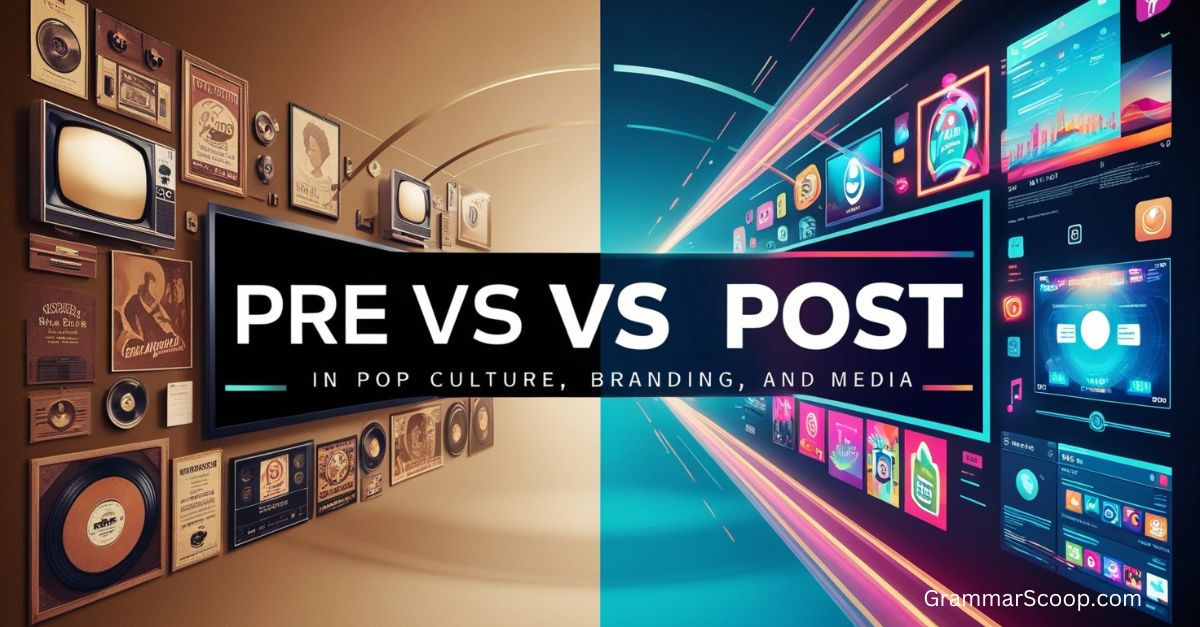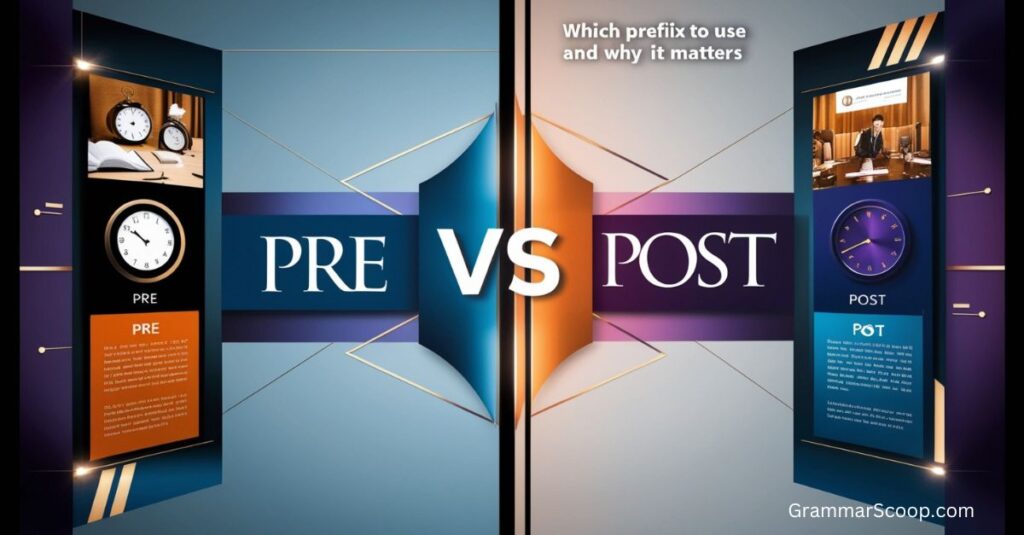Language is a powerful tool, and sometimes, it’s the smallest elements like Pre vs Post that have the biggest impact. Take prefixes like pre- and post-. They may be tiny, but they completely change the meaning of the words they’re attached to. Whether you’re writing a professional report, preparing a school paper, or simply trying to communicate clearly, knowing when to use pre and when to use post can make all the difference.
In this article, we’ll explore the real pre vs post meaning, how each prefix functions in different fields, and why they’re not always perfect opposites. You’ll discover how these prefixes shape timelines, signal intent, and influence everything from healthcare to tech to pop culture.
We’ll also dive into their Latin roots, show examples across industries, and even break down common misuses so you don’t fall into the same traps. If you’ve ever been confused about post vs pre, this guide will clear it up once and for all—helping you communicate with greater accuracy and impact.
Quick Summary
The prefixes pre and post shape the timeline and meaning of words. Pre- means “before,” while post- means “after.” Understanding the difference isn’t just grammar nitpicking—it’s about clarity, precision, and proper usage in writing, speech, and professional communication.
What Do “Pre-” and “Post-” Really Mean?
The Core Meanings — Before vs After
Let’s get to the root of the issue. The prefix “pre-“ literally means “before” something in time, order, or importance. On the flip side, “post-“ signifies “after.” They’re not full words, but they radically shift the meaning of the root words they attach to.
Here’s a simple breakdown:
| Prefix | Meaning | Root Example | Full Word | Meaning |
|---|---|---|---|---|
| Pre- | Before | heat | Preheat | Heat before cooking |
| Post- | After | war | Postwar | Occurring after the war |
If you’re ever confused, just remember: “Pre-game” comes before kickoff. “Post-game” comes after the final whistle.
Prefixes, Not Standalone Words

While some people use “pre” and “post” as slang or shorthand (e.g., “in the pre,” or “he showed up post-event”), grammatically, they are not standalone words. They’re bound morphemes — parts of words that must attach to other elements to carry meaning.
This is crucial when writing formal content. For example:
- “We conducted pre-assessments and post-assessments” is correct.
- “We conducted pre and post” is acceptable in informal conversation, but lacks precision in writing.
Common Misconceptions
It’s easy to assume that pre and post meaning are always perfect opposites. They often are—but not always.
Take these examples:
- Prepaid means paid in advance.
- Postpaid doesn’t mean you never pay; it just means you’re billed afterward.
Sometimes, the context in which a word is used gives it a slightly nuanced meaning. That’s why it’s important not just to memorize pre vs post definitions, but to understand how they function.
Pre vs Post: When to Use Each (with Real-Life Contexts)
Timeline-Based Usage
The simplest way to grasp post vs pre meaning is through timeline logic.
Imagine an event—say, a wedding. Now let’s position things around it:
- Pre-wedding photos = taken before the ceremony.
- Post-wedding dinner = meal held after the event.
This framework applies across industries:
- Medicine: pre-surgery prep, post-op care
- Sports: pre-game rituals, post-game interviews
- Academia: pretest predictions, posttest analysis
Functional Differences
The prefixes don’t just show when something happens—they also reveal the intent:
Pre- words often:
- Indicate preparation or setup
- Signal warnings or prevention
- Focus on readiness
Examples:
- Preemptive strike = an attack launched to prevent one
- Preapproval = a decision made before final approval
Post- words typically:
- Indicate aftermath or follow-up
- Reflect reactions or consequences
- Involve analysis or results
Examples:
- Postmortem = analysis after death or failure
- Postoperative = after surgery monitoring
Industry-Specific Examples
Let’s see how pre vs post plays out across fields:
Education
- Pre-test: measures what students know before instruction
- Post-test: assesses what they learned after teaching
Technology
- Preprocessing: formatting or cleaning data before analysis
- Post-production: editing and finalizing content after filming
Business
- Pre-launch marketing: building anticipation
- Post-launch review: assessing success metrics
These distinctions help with accurate communication, especially in professional contexts.
Read More:
- Of Course or Ofcourse: Which One Should You Use?
- Is It Scrapped or Scraped? Let’s Clarify the Confusion
- Writting or Writing: Never Get Confused Again
- Hoody or Hoodie? Choosing the Right Spelling
Etymology of Pre and Post
Latin Roots and Historical Usage
Both prefixes date back to Classical Latin, a language known for its structure and influence on English.
- Pre- stems from Latin prae, meaning “before.”
- Post- comes directly from Latin post, meaning “after.”
These entered Middle English around the 15th century through French and Latin-derived texts, especially in religious, academic, and medical contexts.
Influence on Modern English
The post and pre meaning expanded in scientific English during the Renaissance. Today, they are deeply embedded in:
- Medical vocabulary (preclinical, postoperative)
- Education (preschool, postgraduate)
- Politics (pre-election polls, post-election analysis)
- Business (pre-revenue startups, post-IPO performance)
Fun fact: The term post-truth was named Oxford Dictionary’s Word of the Year in 2016, showing how these little prefixes still shape big ideas.
Visual Guide: Pre vs Post at a Glance
Timeline Diagram
[PRE] → [EVENT] → [POST]
Example:
Pre-match warmups → Match starts → Post-match press conference
Comparison Table
| Category | Prefix | Example | Definition |
|---|---|---|---|
| Cooking | Pre- | Preheat | Heat oven before baking |
| Medicine | Post- | Postoperative | Care given after surgery |
| Finance | Pre- | Preapproved | Approved in advance |
| Tech | Post- | Postproduction | Editing done after filming |
Commonly Confused Words
Pre- vs Post- in Similar Settings

Let’s break down pre vs post using commonly used paired terms:
- Precondition vs Postcondition
- Precondition = requirement before an action
- Postcondition = result or guarantee after an action
- Pregame vs Postgame
- Pregame = preparation
- Postgame = analysis
- Pregraduate vs Postgraduate
- Pregraduate = still earning an undergraduate degree
- Postgraduate = advanced degree beyond undergrad
Words You Shouldn’t Mix Up
Here’s how using the wrong prefix can change your meaning entirely:
| Incorrect Usage | Why It’s Wrong | Correct Usage |
|---|---|---|
| “Postheat the oven” | You don’t heat after cooking | Preheat the oven |
| “Prehumous tribute” | Tribute before death makes no sense | Posthumous tribute |
| “Postboard meeting” | Lacks clarity | Post-board meeting |
Always verify with a dictionary or style guide if unsure.
How to Choose the Right Prefix Every Time
Ask These Questions
- Is this action happening before or after something?
- Does this term relate to setup or reaction?
- Is this term commonly used in a specific industry or field?
Tips for Remembering
- PREview = you look at it before watching
- POSTmortem = it only happens after an ending
Here’s a handy mnemonic:
“PREpares you, POST reflects on you.”
Examples from Everyday Language
Pre- in Action
- Prebook: Reserve something before arrival
- Preexisting: Already in place before a change or event
- Prenuptial: Agreement before marriage
- Preteen: Age before reaching teenage years
These signal setup, protection, or existing conditions.
Post- in Action
- Postseason: After the regular sports season
- Postgraduate: After obtaining a bachelor’s degree
- Postscript (P.S.): Written after the main message
- Postwar: Period after conflict ends
These indicate follow-ups, consequences, or aftermath.
Pre vs Post in Pop Culture, Branding, and Media

Prefix-based language shows up everywhere—including in branding:
- Postmates: Delivery after you order
- Prezi: A tool for presentations
- Post Malone: Stage name that uses the prefix creatively
Even pop songs use it:
- “Prettier Before” (suggests change over time)
- “Post Breakup Sex” (timing-based emotional context)
In memes:
- “Pre-coffee me vs post-coffee me”
These playful uses reinforce how pre and post meaning shape how we express time, emotion, and sequence.
Quiz Yourself: Are You Using the Right One?
Fill in the blank:
- She had a ________ meal snack. (pre/post?)
- He gave a ________ speech analysis. (pre/post?)
- We completed a ________ assessment. (pre/post?)
Answers:
- Pre-meal
- Post-speech
- Pre-assessment
Use quick quizzes to test your prefix instincts—they help commit the logic to memory.
Final Thoughts: Which Prefix to Use?
In the debate of pre vs post, the answer lies in context and clarity. Remember:
- Use pre- when referring to anything happening before an action or event.
- Use post- when referring to the aftermath or result.
Understand the post vs pre meaning deeply, and you’ll avoid misunderstandings and sharpen your communication.
“Prefixes are tiny, but they pack a powerful punch. Use them well, and you control the timeline of your message.”
Now that you know the difference, go out and write with confidence. Preach it—or post it.

Lisa Morris is a seasoned blogger and language enthusiast with a passion for making grammar simple and engaging. At Grammar Scoop, she shares clear, concise tips that help readers master the rules of English with confidence.






